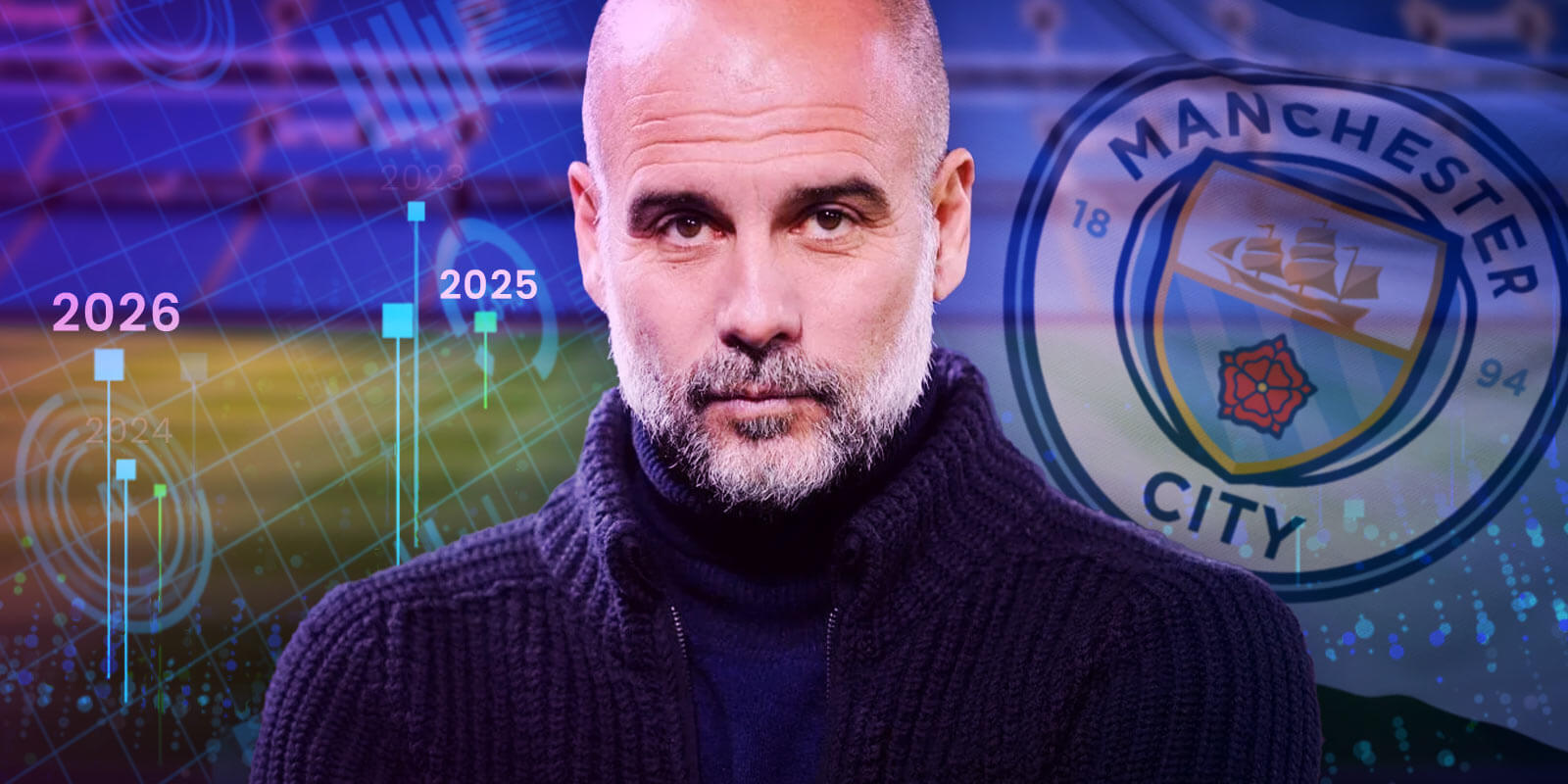Past Patterns: The True Probability of Manchester City Replacing Pep Guardiola Before 2026

Affiliate Disclosure : We earn a commission from partners links on BetterGambling. Commissions do not affect our editors' reviews, recommendations, or ratings.
The bookmakers already know Pep might leave before his contract ends. You’ve probably seen the headlines, maybe even scrolled past the odds on the next City manager. But here’s the problem: most markets don’t tell you why the line is shaped the way it is. And more importantly, they don’t tell you who’s influencing it. This isn’t about one manager. It’s about a system that prices loyalty, fatigue, and timing, often before the press does.
- Bookmakers’ Odds to Replace Guardiola: Real Betting Data Breakdown
- Why the 2026 Line Isn’t Random
- Pep’s Timeline: Patterns They Don’t Talk About
- Elite Manager Burnout: What the Numbers Actually Show
- Club Signals: The Clues in Staffing, Spending, and Silence
- How Bookmakers Quietly Price Managerial Moves
- Bibliography
Bookmakers’ Odds to Replace Guardiola: Real Betting Data Breakdown
To provide a clearer picture of the current market expectations, here are the latest odds from reputable UK bookmakers, presented in fractional format alongside their implied probabilities:
| Manager | Best Odds (Fractional) | Implied Probability |
|---|---|---|
| Julian Nagelsmann | 3/1 | 25.0% |
| Roberto De Zerbi | 5/1 | 16.7% |
| Mikel Arteta | 6/1 | 14.3% |
| Xabi Alonso | 8/1 | 11.1% |
| Luis Enrique | 10/1 | 9.1% |
| Mauricio Pochettino | 12/1 | 7.7% |
| Zinedine Zidane | 14/1 | 6.7% |
How to Read These Odds
- Fractional odds like 3/1 mean that for every £1 bet, you win £3 if successful. Lower odds = higher perceived chance.
- Implied probability is calculated using: Denominator / (Denominator + Numerator) × 100.
-
For example, 3/1 = 1 / (3+1) = 25%.
-
These figures reflect current market expectations and help paint a realistic picture of who bookmakers believe is most likely to succeed Guardiola, based on actual betting patterns, not speculation.
Why the 2026 Line Isn’t Random
There’s a reason most markets are quietly setting 2026 as the outer edge of Pep Guardiola’s future at Manchester City. Not because he said so. Not because the club confirmed it. But because of how elite managerial lifecycles work, and how they’re usually predicted from the inside.
Pep’s current deal ends in 2025. That’s public (read the official club announcement on Guardiola’s new contract). But the 2026 date floating in the background pricing isn’t a mistake.
It’s based on the pattern we’ve seen with elite European clubs who build long-term projects: a “last chance” season is typically priced in behind the public contract, to account for club hesitation, performance buffers, and exit planning. This line isn’t about risk. It’s about operational logic. And if you’re watching the odds, you’re not watching for shock. You’re watching for confirmation.
Pep’s Timeline: Patterns They Don’t Talk About
Start with what we know, not from headlines, but from his professional rhythm. Guardiola spent four years at Barcelona, three at Bayern, and has already completed eight with Manchester City. This alone breaks his historical curve.
When managers operate at the intensity Pep does, controlling training, recruitment, media messaging, and even academy transitions, burnout isn’t just emotional. It’s structural. There’s only so much evolution you can drive before returns start to flatten.
Even with domestic dominance, you’ve seen signs. The Champions League win was framed by Pep himself as “the final piece.” The loss of trusted assistant Juanma Lillo, then his return, followed by more staff turnover, tells you what the odds don’t. The structure around Pep is changing. When that happens, exits tend to follow quietly and with little press buildup.
Ignore the press statements. Watch the routine. His patterns point toward a limit, and most traders are already factoring that in.
Elite Manager Burnout: What the Numbers Actually Show
You don’t need to guess when top managers leave. You just need to look at historical data from the elite five. Ferguson was the outlier. Most others, Mourinho, Klopp, Ancelotti (in his first stint), Zidane, and even Tuchel, reach a ceiling in years 4 to 6.
Why? Because maintaining tactical intensity, squad evolution, and internal influence starts to break down after the third cycle. Players shift. Results become expected. Media tension rises. And the manager loses either control or energy.
Guardiola is now in his third squad cycle at City. That means most of the players he built around, Silva, Gündoğan, and Mahrez, are gone. Even younger core players like Foden and Stones have seen their roles redefined multiple times.
If you’re asking whether 2025 is the exit point, you’re already late. The market priced that possibility last year. Reports already indicate Guardiola may quit if key changes continue. 2026 isn’t optimism, it’s the outer limit.
Club Signals: The Clues in Staffing, Spending, and Silence
Manchester City rarely speaks when something major is happening. That’s not theory, we’ve seen it in the past, too. When Sergio Agüero left, the decision was made long before it was announced. When Ferran Soriano and Txiki Begiristain adjusted the transfer policy in 2020, the press only caught up months later. That’s how this club moves: early, quiet, and always with a two-season horizon.
Right now, you’re seeing 3 things:
- An internal shift toward more youth-driven recruitment (Gvardiol, Nunes, Bobb)
- A flatter press strategy, with fewer Guardiola-led media moments
- Zero board comment on Guardiola’s post-2025 future, despite mounting speculation
That silence isn’t indecision. It’s future-proofing. If there’s no push to extend and no urgency to kill the rumours, succession planning is already underway. Not publicly. Internally.
How Bookmakers Quietly Price Managerial Moves
Here’s the part most people miss: Odds aren’t just about public information. Private assumptions and predictive modelling shape them. When bookmakers set early markets on “next permanent Manchester City manager,” they’re not guessing. They’re reacting to:
- Known contract cycles
- Insider hiring patterns
- Proxy movements (agents, interviews, non-denials)
- Quiet money from sharp sources
That’s why you rarely see aggressive promotions around these specials. The lines are soft. The markets are thin. And smart money often comes in early, before the news hits.
Odds on managers like Xabi Alonso or Roberto De Zerbi don’t appear by accident. They appear when conversations start moving behind the curtain, like the ones linking Guardiola with potential Bayern Munich-linked replacements.
Similarly, a post on X from the page Transfer News Live further supports rumours that Xabi Alonso could become Man City’s new manager:
🚨 Xabi Alonso is Real Madrid's priority to replace Carlo Ancelotti, when his contract ends in 2026.
The Spaniard is also a topic within Manchester City to possibly replace Pep Guardiola.
(Source: @PippoArens / @AxelHesse1) pic.twitter.com/4wxphdNMFC
— Transfer News Live (@DeadlineDayLive) February 26, 2025




